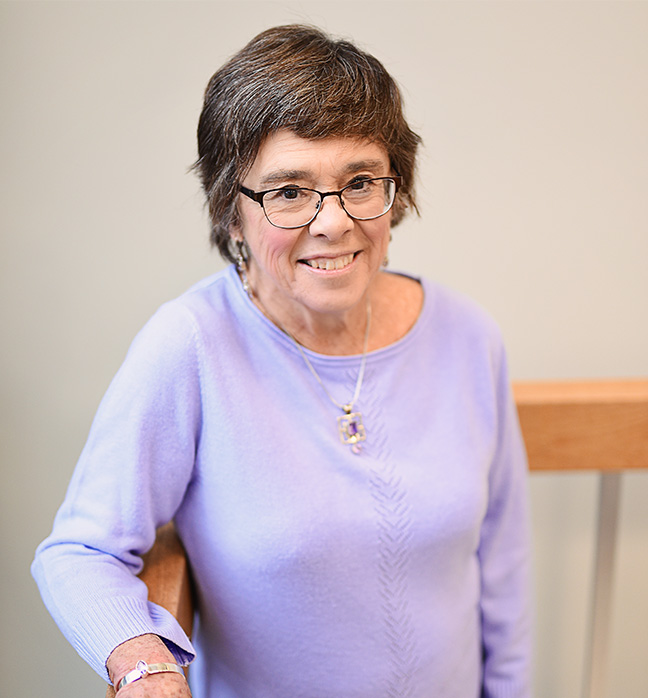The Circle Never Ends
February 8, 2025
New fund supports professional development for PHM/TOX faculty
 When Sue Barman arrived in East Lansing in late 1975, her plan was to stay for two years. She is now a University Distinguished Professor who will celebrate 50 years at MSU on November 1, 2025. To commemorate and continue this legacy, the Dr. Susan M. Barman Department of Pharmacology and Toxicology Faculty Professional Development Endowed Fund has been established.
When Sue Barman arrived in East Lansing in late 1975, her plan was to stay for two years. She is now a University Distinguished Professor who will celebrate 50 years at MSU on November 1, 2025. To commemorate and continue this legacy, the Dr. Susan M. Barman Department of Pharmacology and Toxicology Faculty Professional Development Endowed Fund has been established.
The fund—grown from Barman’s passion, history of mentorship, and research career path—will support faculty professional development. The funds will be available for those with at least a 50 percent appointment in Department of Pharmacology & Toxicology.
“I really enjoy mentoring and decided to support other faculty who need special equipment they lack funds for or opportunities they may not otherwise have,” Barman said. “There were many scientists along my career path who encouraged me and believed in me, and this fund will be a boost for faculty at whatever point they are at, regardless of experience."
Shattering glass through determination
Coming up in the 1970s as a female scientist posed its own set of unique challenges. Barman was initially rejected from the Department of Physiology at Loyola University School of Medicine in 1971 but then she reapplied and was accepted in 1972. Soon after arrival, she saw her original application which read:
REJECT: female problem
This didn’t deter her, and neither did an interview at Wake Forest several years later when a faculty member asked Barman why they should hire a woman, saying “you might get married and have kids, which would disrupt your career.”
“Are you married?” Barman asked.
He said, “Yes.”
“Then you might get a divorce and that could totally disrupt your career,” Barman said.
As she walked out of the office, Barman saw an administrator smiling and clapping her hands. It was the faculty members’ wife.
Far-reaching effects of mentorship
Mentoring has always been something Barman has excelled at, perhaps because it has been modeled so well for her. As one can imagine, Barman has received many recognitions and awards over the course of her long career.
One of her mentees, Dr. Sandra Hewett—the Beverly Petterson Bishop* Emerita Professor of Neuroscience at Syracuse University—said this in Barman’s nomination letter for the 2020 Bodil M. Schmidt-Nielsen** Distinguished Mentor and Scientist Award:
“Sue [Barman] became a most influential “wise advisor” during my days as a PhD student at MSU; a relationship that was cultivated then and continues today. It was Sue Barman who encouraged me to stay in graduate school when I felt like quitting. She helped me understand that my passion for scientific exploration should and could not be extinguished by external forces. Importantly, she taught me how to be courageous and deal with the difficulties at hand.”
Dr. Hewett is currently the neural development program in the Division of Neuroscience, National Institutes of Neurological Disorders and Stroke at the NIH. Hewett has gone on to mentor many other scientists herself by following Barman’s example throughout her career.
Another mentee of Barman’s has been Department of Pharmacology and Toxicology and Walter F. Patenge Chair of Osteopathic Medicine Anne Dorance, PhD. When Dr. Dorance arrived at MSU nearly 20 years ago, Barman befriended and mentored her—Dorance calls Barman’s commitment a “game-changer.”
“She is a fantastic role model for early-stage faculty, and her story can teach us all to stand up and fight for our science and the things we are passionate about,” Dorance said. “Very few programs will provide funding for faculty to gain additional training or professional development – I am hugely grateful for her gift to the department and excited to see where this support takes the team.”
A green and white path
 During her years at Loyola, Barman was impressed by a paper she read by Dr. Gerard “Jerry” Gebber. The paper was on Barman’s research interest area, neural control of the cardiovascular system.
During her years at Loyola, Barman was impressed by a paper she read by Dr. Gerard “Jerry” Gebber. The paper was on Barman’s research interest area, neural control of the cardiovascular system.
“I met Dr. Gebber and knew he was a fantastic scientist,” quipped Barman. “My dream came true when he asked me to come to MSU for a post-doc.” Despite having an offer to go to a lab in Germany, Barman ultimately chose to come to MSU and study with Gebber. “I got my first NIH grant as a PI in 1985 and then in 1995, I was honored to be the first woman at MSU to receive the NIH’s Method to Extend Research in Time award.”
“I was the first woman to become a professor in the Department of Pharmacology & Toxicology, and I reached that milestone as a fixed-term faculty member after revising our bylaws to describe criteria for promotion in the fixed-term system.”
An iconic faculty member within the Pharmacology and Toxicology Department, Dr. Barman was named University Distinguished Professor in 2021, the first female scientist at the College of Human Medicine to hold the title. While Barman’s career can be defined by hard work, tenacity, and service to others, it also means she’s a Spartan at heart.
“My hope is for people to say, “She did a lot of good,”” Barman said. “This department is like a family to me, and it’s been a joy of my life to find the good in others, just as others have sought to find the good in me.”
*Ironically, Hewett’s endowed chair was funded by a woman Barman knew from the American Physiological Society, an organization in which Barman served as President in 2013.
**Bodil Schmidt-Nielsen was a Danish-born American physiologist. Both Schmidt-Nielsen’s parents were also physiologists, and her father was Nobel Prize Laureate August Krogh. In 1975 Bodil Schmidt-Nielsen became the first woman president of the American Physiological Society.
By Sarah Enlow

